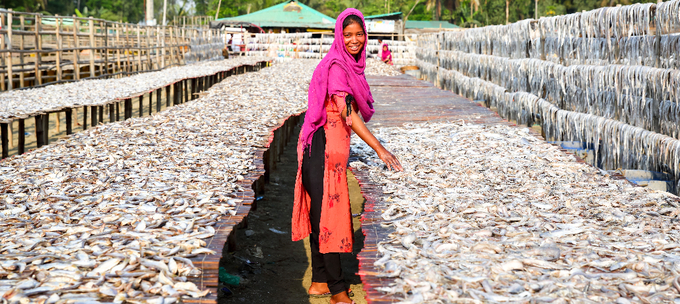June 1, 2025 | 22:58 GMT +7
June 1, 2025 | 22:58 GMT +7
Hotline: 0913.378.918
June 1, 2025 | 22:58 GMT +7
Hotline: 0913.378.918

Small-scale fisheries produce 40 percent of all the fish we eat. They are small in name, but not in value! Yet, many small-scale fishers and fish workers suffer from poverty and marginalization, work under substandard conditions, experience high fatality rates and suffer occupational safety and health risks.
The Food and Agriculture Organization of the United Nations (FAO), the Vatican and the Catholic maritime charity, Stella Maris, today marked World Fisheries Day with a call for greater social protection for small-scale fishers and fish workers.
As the International Year of Artisanal Fisheries and Aquaculture (IYAFA 2022) draws to a close, FAO, the Holy See and Stella Maris held a high-level event entitled “Investing in social protection to secure equitable Blue Transformation in the fisheries sector,” at FAO’s headquarters in Rome.
FAO Director-General, QU Dongyu, said many people employed in the fisheries sector had limited access to finance and insurance, safety networks and social programmes to help them survive and prosper.
“Small-scale fisheries produce 40 percent of all the fish we eat,” Qu said. “They are small in name, but not in value! Yet, many small-scale fishers and fish workers suffer from poverty and marginalization, work under substandard conditions, experience high fatality rates and suffer occupational safety and health risks.”
The hybrid event reflected on the devastating impact of the COVID-19 pandemic, climate shocks and economic challenges to the fisheries sector and the need to protect fishers and their rights. During the pandemic, value chains were disrupted, jobs were lost and fishing stopped altogether in many countries because of COVID-19 restrictions.
Qu said social protection and labor market interventions had been the single most important policy response to address the socio-economic impacts of COVID-19. Social support enabled households to invest in education and youth employment, he added.
FAO’s Voluntary Guidelines for Securing Sustainable Small-Scale Fisheries in the Context of Food Security and Poverty Eradication, endorsed in 2014, are a call to action, Qu said.
In his address, Cardinal Michael F. Czerny, the Prefect of the Vatican’s Dicastery for Promoting Integral Human Development, urged Member States to implement the FAO guidelines and called on participants to challenge governments and other parties to improve management and governance.
Participants discussed the need for greater coherence between social protection and fisheries policies to support social development and equitable sustainable fisheries management.
The event shared ideas and recommendations to contribute to sustainable development and equitable Blue Transformation – bringing together these goals to promote social and economic development as well as fisheries sustainability.
The 2021 Committee on Fisheries (COFI) Declaration for Sustainable Fisheries and Aquaculture calls on States to facilitate access to social protection programmes for fishers and aquaculture producers and their communities.
(FAO.org)

(VAN) Vikas Rambal has quietly built a $5 billion business empire in manufacturing, property and solar, and catapulted onto the Rich List.

(VAN) Available cropland now at less than five percent, according to latest geospatial assessment from FAO and UNOSAT.

(VAN) Alt Carbon has raised $12 million in a seed round as it plans to scale its carbon dioxide removal work in the South Asian nation.

(VAN) Attempts to bring down the price of the Japanese staple have had little effect amid a cost-of-living crisis.

(VAN) Fourth most important food crop in peril as Latin America and Caribbean suffer from slow-onset climate disaster.

(VAN) Shifting market dynamics and the noise around new legislation has propelled Trouw Nutrition’s research around early life nutrition in poultry. Today, it continues to be a key area of research.

(VAN) India is concerned about its food security and the livelihoods of its farmers if more US food imports are allowed.